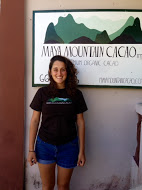
Just outside San Pedro Columbia, a traditional Q’eqchi Maya village in southern Belize, lie 120 acres of pristine jungle where lush rainforest vegetation has grown wildly, taking advantage of the fertile soil.
In 1991, the Belize government leased this land to local subsistence farmers with the intention of developing industry through agriculture. However, with limited resources available to develop the land, the parcel holders have left it untouched. In the meantime, wild bananas, jungle plums, and cohune palms grew freely between mahogany, salmwood, and cedar trees.

|
|
Maya Granit, |
Earlier this year, Maya Mountain Cacao (MMC) began working in collaboration with the parcel holders’ families, the local village government and other key stakeholders to improve farmer livelihoods, grow the local blossoming cacao industry, and do it all in an environmentally and socially conscious way.
MMC, in collaboration with these local leaders, is developing this land as an environmentally sustainable, certified organic, world-class cacao Demonstration Farm.
It has just launched a Kickstarter campaign to help fund the project: Indigenous Innovations: Revolutionizing the Cocoa Industry in Belize. MMC is aiming to raise $80,000 in the next two weeks. And there are some delicious rewards for the people who help make it happen!
To give some background, MMC was founded in 2010 by a team of of local Belizean cacao farmers, chocolate makers, and American entrepreneurs. Today, MMC works with 330 smallholder Belizean cacao farmers, and connects them to specialty chocolate makers in the United States.
The Toledo District of southern Belize — where MMC sources the vast majority of its cacao — is populated primarily by indigenous Q’eqchi and Mopan Maya. A staggering 69 percent of the population is under the regional poverty line, and most of the farmers have about 1 to 3 acres of farming land.
Until recently, it was extremely difficult for farming families to get their cocoa to the market, and for them to secure a fair price once they made it there.
MMC was created with the mission of creating a more farmer friendly model. Since 2010, the group has generated up to 400 percent income increases for farmers through improved market access, micro-credit opportunities and 100 percent-plus yield improvements on farms through a combination of technical services and market incentives.
Today, MMC directly serves seven customers, with more than 80 on the wait list for delicious Belizean cocoa. To increase production, this year MMC is helping plant 82,000 new cacao trees, and providing technical assistance and farming microloans to over 165 farmers.
The Demo Farm will address some of these issues, and more. It will increase Belize’s annual production by 50 percent, bringing more of Belize’s cacao to chocolate bars all over the world. It also has already created 40 jobs for the local farming community.
Ultimately, the Demo Farm will be a source of pride and economic development for the country of Belize, as well as a practical tool used for local and industry-wide cacao farming education.
Cocoa farmers and buyers globally have an opportunity to learn from the lessons set by our relatively tiny farming community.
By combining traditional farming practices with modern science, the community is able to preserve their customs and heritage, while driving value from the modern market.
Here in Belize, we’re excited about high quality cacao as well as farmer and industry education. We’re making an impact in the local community by developing an industry together, from the ground up — from seed to tree to bean to bar!
Maya Mountain Cacao launched a Kickstarter campaign to help fund the agroforestry Demonstration Farm. To support the project, check out the Kickstarter page here.
